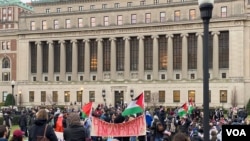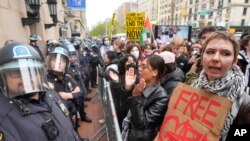More than 100 Columbia University students were arrested Thursday, culminating months of on-and-off student protests on campus since October 7 when the war between Israel and Hamas began.
Columbia has seen numerous protests with students voicing their support for Palestinians and against Israel's bombing of Gaza that has resulted in the deaths of about 33,000 Palestinians, according to the Gaza health ministry.
The arrests were authorized by university President Minouche Shafik a day after she testified at the U.S. House of Representatives hearing, "Columbia in Crisis: Columbia University's Response to Antisemitism."
"I took this extraordinary step because these are extraordinary circumstances," Shafik said in an email to Columbia students, faculty and staff as the arrests began.
The students, calling themselves Columbia University Apartheid Divest, erected dozens of tents at 4 a.m. Wednesday on the east lawn at the center of the university campus. They also put up a banner asserting the space as the "Gaza Solidarity Encampment."
The students posted demands to the group's Instagram account, including calls for Columbia to divest from "companies and institutions that profit from Israeli apartheid, genocide and occupation in Palestine." They added they intended to remain in the encampment until their demands were met.
According to Shafik, the protesters had been told several times that they were violating university polices and must disperse. She also said that "all university students participating in the encampment have been informed they are suspended. At this time, the participants in the encampment are not authorized to be on university property and are trespassing."
The New York Police Department Strategic Response Group arrived about 1 p.m. Thursday and used zip-ties to handcuff protesters and remove them from campus. They were loaded onto correctional facilities buses to 1 Police Plaza. The 108 students were charged with trespassing, and two were additionally charged with obstruction of governmental administration, Captain Jaclyn Keane confirmed at a news conference and reported by the Columbia Daily Spectator, the student newspaper.
It was the first mass student arrest on Columbia's campus in 50 years.
Supporters of the encampment surrounded the fenced-in east lawn following the arrests, shouting "Shame on you" and other chants at NYPD officers who remained on the scene. The supporters eventually moved to the campus' west lawn in an impromptu occupation.
The second occupation drew the support of several prominent activists, including Palestinian writer and poet Mohammed el-Kurd and Cornell West, a U.S. independent presidential candidate and Columbia faculty member, who spoke to the crowd.
"They can read Sophocles, they can read Karl Marx, they can read Martin Luther King, but when it's time to take a stand against genocide, they won't do it," West said of the Columbia administration while standing in the center of sitting protesters.
Around 6 p.m. Thursday, a student protester urged the crowd to stay.
"We are asking that in solidary with the people in Gaza you continue to remain on this lawn. ... Remember that solidarity is an action it is not just a feeling, and we want you to remain here as long as possible," she said.
As of Thursday evening, protesters occupied the campus' west lawn in larger numbers than the night before, bringing in a few tents and supplies and preparing to spend the night.
Outside of the campus, supporters marched and chanted around the campus in solidarity with those inside.
These recent actions are a continuation of tensions on Columbia's campus since October 7. Actions on the campus have thrust Columbia into the spotlight as student activism at elite universities entered nationwide discourse about the Israel-Gaza war. Harvard President Claudine Gay and University of Pennsylvania President Liz Magill resigned following backlash to their statements in front of the House Education subcommittee at the beginning of the year.
Representative Virginia Foxx, chairwoman of the House Committee on Education and the Workforce, issued a statement Thursday in support of the arrests, writing "Columbia must take the bold and difficult actions necessary to address the pervasive antisemitism, support for terrorism, and contempt for the university's rules that have been allowed to flourish on its campus. This includes real discipline that matches the severity of offenses by the students, faculty, and staff responsible, including suspension, expulsion, and termination."





